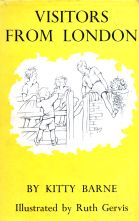Visitors from London facts for kids

Front cover of first edition
|
|
| Author | Kitty Barne |
|---|---|
| Illustrator | Ruth Gervis |
| Country | United Kingdom |
| Language | English |
| Genre | Children's war novel (home front) |
| Publisher | J. M. Dent |
|
Publication date
|
1940 |
| Media type | Print (hardcover) |
| Pages | 262 pp (first edition) |
| OCLC | 152406848 |
| LC Class | PZ7.B2593 Vi |
Visitors from London is a children's book written by Kitty Barne. It has 40 drawings by Ruth Gervis and was published in 1940. The story takes place in Sussex, England, during World War II. It's about what life was like on the home front – meaning, what happened to people who stayed in Britain during the war. The book shows how families prepared for and welcomed children who were evacuated (moved to safety) from London.
The author, Kitty Barne, won the annual Carnegie Medal for this book. This award is given to the best British children's book of the year. An American version of the book was also published in the same year by Dodd, Mead.
What the Story Is About
The story happens in the countryside of Sussex during the summer holidays of 1939. This is just before World War II officially began. The four Farrar children are spending their break with their unique Aunt Myra. At first, war seems far away and not a problem for them.
Soon, things change. Seventeen young people from London, called "Cockney evacuees," are coming to stay. They have never left the city before. They will live at Steadings, a farmhouse nearby that has been empty. The Farrar children help get everything ready. They find staff and organize the house for the new arrivals.
When the evacuees finally arrive, the Farrar children realize they are not fully prepared. They face new challenges as they try to help the city kids settle into country life.
How the Book Was Created
Kitty Barne, the author, knew a lot about the topic of evacuation because she experienced it herself. She was involved in "Operation Pied Piper." This was the first big plan to move children from cities to the English countryside during World War II.
As a member of the Women's Voluntary Service (WRVS), Kitty Barne helped welcome these evacuated children in her home county of Sussex. The WRVS was a group of women who volunteered to help people during the war. Her real-life experiences helped her write a very true-to-life story about the challenges and adventures of welcoming evacuees.
 | Shirley Ann Jackson |
 | Garett Morgan |
 | J. Ernest Wilkins Jr. |
 | Elijah McCoy |

